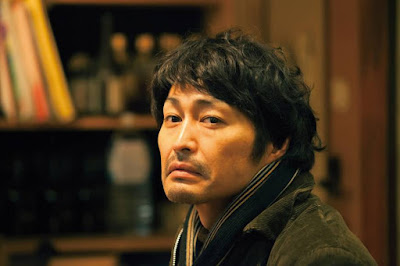Their
Distance (Shiranai, Futari): Written and directed
by Rikiya Imaizumi. Starring: REN, Fumiko Aoyagi, Hanae Kan, Minhyun, JR. Running
Time: 109 minutes.
Rating:
3/4
One
of the problems I tend to have with rom-coms is that the characters never come
across as more than just figures on a flat screen- the writing and acting never
seems to be realistic enough that I can actually buy any of the relationship
drama it depicts as being things that happen to real people. Their
Distance, thankfully, is a great counterexample of how to do this sort of
film well- it’s enjoyably cute, and appropriately gooey-happy in the resolution
of its conflicts, but makes sure its character always come across as genuine
human beings.
Leon
is a Korean-Japanese working in a tiny, hole-in-the-wall shoe shop, and he’s
apparently more than happy to keep things that way. He’s also a bit clueless, as he doesn’t seem
to realize just how hard his coworker Kokaze is crushing on him. His detachment from daily life and other
people seems to be a new thing- details are vague at first, but we learn he was
involved in an accident that paralyzed someone, and has been carrying around
the guilt ever since.
He’s
finally shaken from his existential reverie when he walks to his usual park
bench for lunch, and finds a strange girl (also apparently Korean) sleeping on
it. She wakes and stumbles away, clearly
hungover, but he is smitten with her (and, as we soon learn, she with
him). He doesn’t know how he will find
her again, until another Korean guy comes into the store asking to have a pair
of heels repaired. Lo and behold, it’s
the same heels the mysterious girl was wearing.
This
is the point where we jump into the other circle of characters, a group of
close friends consisting of Park Bench Girl, the friend who dropped her shoes
off, and her longtime boyfriend (also Korean).
Her boyfriend shocked her just the night before with the news that he’s
fallen in love with his Japanese teacher, a young woman who, would you believe
it, is the longtime girlfriend of the man injured in the accident Leon was
involved in some years ago. She’s angry,
hurt, and dismissive at first, but soon begins to sympathize with her boyfriend
when she realizes she, too, has fallen head over heels for someone she barely
knows. And from there we are off to the romantic
races, as the web of possible relationship outcomes multiplies over the course
of the second act.
As
twisted up as some of the potential relationship threads get, what really makes
the movie stand out is its excellent use of a clever time skip- we see things
from Leon’s perspective for about a week, seeing how he heads out each night to
the address left with the shoes, and how he is followed with equal diligence by
Kokaze. At first, though, it gets more
fragmented as the days go by, and at a seemingly random point, he suddenly
stops going to the house at night, and simply heads home like he used to. This seems a bit strange at first, but its
time well-taken for setup; it’s immensely satisfying when we finally jump back
in time to the beginning, and slowly have all the gaps in the story filled in
piecemeal. It’s a small cinematic trick,
but done remarkably well.
The
key for this movie, though, is how sweetly genuine the actors are. There are two major “breakup” scenes, mostly
done with long takes and few cuts, and they feel powerfully real. I know these people. I’ve had these conversations. And for a people-driven story, that is
essential. The growth everyone goes
through as a result is small but noticeable, and even if much of the status quo
is preserved by the end, it’s at least embraced with greater warmth, certainty,
and self-confidence that before. And
that is indeed worth a great deal.
-Noah Franc








